FV Foods’ Recipe for Success: 20 Lessons in 20 years
FV Foods’ Recipe for Success: 20 Lessons in 20 years

Mel Galeon on his 50th birthday
By Michelle Chermaine Ramos
The Philippine Reporter
For the last 20 years, FV Foods has brought Filipino-Canadians the sweet nostalgic taste of home with traditional Filipino sweets, cakes, pastries and desserts. The company started from humble beginnings as a one-man home-based operation by co-founder Melchor Galeon.
Today FV Foods has 80 employees and their products are distributed in Asian and Canadian retailers across eight provinces in Canada and have been in nonstop production despite the COVID-19 pandemic with no signs of slowing down.
October 10, 2020 marks his company’s 20th anniversary for which Galeon has much to be proud of, yet he remains humble remembering where he came from. Twenty-two years ago, he was an immigrant struggling to survive in Toronto. By May 12, 2012, he was inducted into the Asian American Hall of Fame for business. The products of FV Foods, his brainchild with his late partner Flor Vendiola, have become a staple at many cultural festivals. The Lawrence and Warden branch has become a popular go-to spot for Pinoy celebrities visiting Toronto.
Through its growth and popularity, FV Foods introduced the culinary delights of the Philippines to Canadians from all walks of life including Prime Minister Justin Trudeau who visited the restaurant in 2019 after Galeon taught him how to grill Filipino barbecue at The Taste of Manila festival years prior.
Many would not even imagine that FV Foods was originally born from a string of Galeon’s early “failures”. There is little-known story of how FV Foods was born out of Galeon’s crucial decision to “pivot” for his own survival and the many challenges he and Vendiola overcame including the SARS pandemic, a recession and other plot twists and turns along the way. In this exclusive interview, Galeon recounts his story starting with how he developed his business acumen as a child in the Philippines.
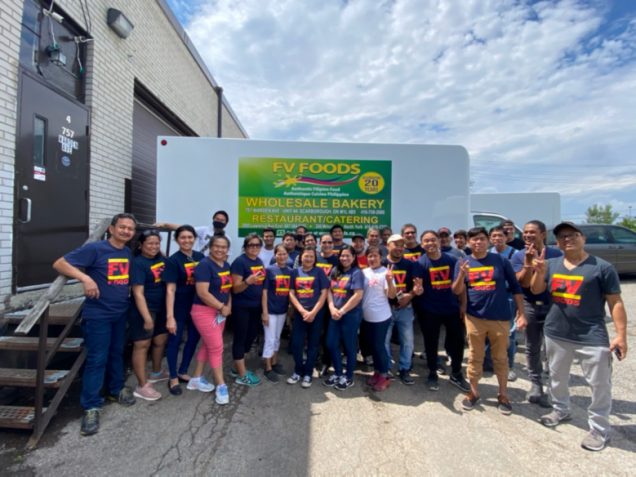
2019 FV Foods factory staff
1. Give a child some bread and he’ll eat for a day. Teach him how to bake and he might just start a business – or more
Galeon is the youngest of three siblings and grew up in a family full of talented bakers and cooks in Sariaya, Quezon from whom he learned culinary skills at a young age. While still in elementary school, he made and sold iced candy, yema and polvoron to earn some pocket money. Later as a nursing student, he outsourced production by buying homecooked meals from his relatives which he sold to his classmates and professors during the week.
2. Location is key
On weekends, Galeon sold his wares in front of his house which happened to be located across a popular bakery in their town. He strategically positioned himself so that whenever the bakery sold out all of their goods in the first four hours of the day, the traffic they generated would be diverted towards him. By 1988, at the age of 28, he had four pasalubong stores: three in Sariaya and one in Lucena, Quezon, one of which included a bakery/restaurant at a high traffic stopover for buses going to Bicol, Visayas and Mindanao. He ran these businesses for over ten years prior to moving to Canada.
3. Rejection can be redirection
Sometimes what first seems like failure is actually a nudge in the right direction. Initially, Galeon applied for a US visa but was denied not once, but three times. In 1998, he was the Vice President of the Quezon Provincial Tourism Council and was well known in his area for his pasalubong stores selling Quezon province delicacies. He received an invitation from the Philippine Independence Day Council via the Philippine Department of Tourism to participate in a trade show at the Mabuhay Festival in Toronto. That summer, the festival was held at the Canadian National Exhibition where the Philippines was the country in focus. Galeon was chosen to represent Quezon province so he packed his bags full of goodies, took a giant leap of faith and arrived in Canada on August 16, 1998 where despite having no connections, he was determined to start from scratch to seek his fortune.
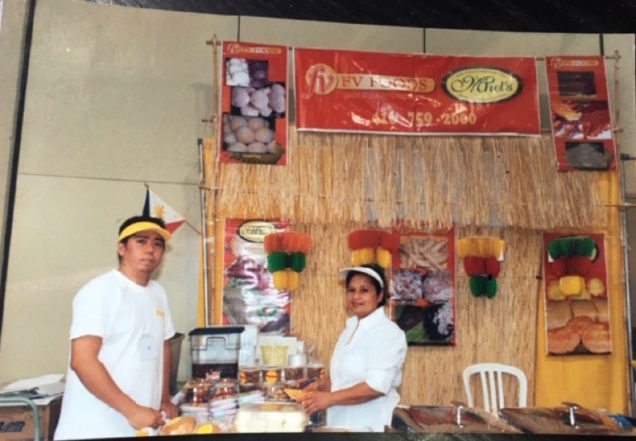
Mel Galeon and Flor Vendiola at their warehouse in the early years
4. Find a need and fill it
Galeon quickly sold out his products at the CNE and realized there was a huge demand for Filipino sweets that Filipino-Canadians craved from back home. “Back then there was no competition in Toronto since there were no manufacturers of Filipino sweets and Filipinos were too busy working to make them at home,” Galeon explained. This is where he first met Flor Vendiola who was the president of the Sariaya Association of Ontario at the time.
5. Your education or profession might be completely different from your calling
Like many new immigrants with medical backgrounds, Galeon wanted to get a job as a nurse and hit a painful roadblock realizing that his foreign credentials were not recognized in Canada. It is not unusual to change careers and your profession is not necessarily your calling. Reflecting on the current COVID-19 pandemic and SARS in 2003, Galeon said that he was able to apply his knowledge of nutrition, sanitization and the prevention of the spread of diseases to ensure health and safety practices in all FV Foods locations to protect himself, his staff and customers.
6. Leverage your other skills
To survive in Canada as a newcomer with no Canadian work experience in 1998, Galeon first worked as a dance instructor teaching ballroom dancing at various Filipino organizations’ parties on weekends where Vendiola helped him network. This is where he began to sell his homemade ensaymada and other sweets which he spent the weekdays baking in his uncle’s garage in Mississauga.
In January 1999, he got his first bachelor’s apartment where he was able to bake more goods in his own space. He also worked as a cleaner at a tailoring shop in downtown Toronto and eventually landed a job as a live-out caregiver for a senior. However, four months later, his employer moved to a nursing home and he was jobless again.

Flor Vendiola
7. Stay away from pessimists and create your own opportunities
It is easy to be discouraged when you are around people who constantly complain about life’s hardships. Galeon recalled being bombarded with negativity from naysayers who had grown cynical with their job searches. “Even though I was a nurse, the people I talked to only had negative comments and said I wouldn’t find a job,” Galeon recounted. “I realized if no one would hire me, then I could work for myself and just bake and sell my products to Filipino stores which I found in newspapers.”
Back then, Galeon started his home business with no website, no internet access, no social media and none of the technological tools new startups take for granted today, but that did not stop him. To source the best ingredients, he combed through the Yellow Pages and community newspapers to find supermarkets and wholesale suppliers. He and Vendiola trekked to various locations to find supplies and make deliveries without the convenience of a GPS.
8. Work smart – find ways to automate and multitask
Working as a one-man operation with the constraints of the small oven in his apartment from January to October 1999, Galeon had to work efficiently to fulfill the growing demand for his products. He batch processed by grouping items with similar baking times to maximize his oven’s space. This enabled him to increase his output while reducing production time which freed him to handle other tasks.
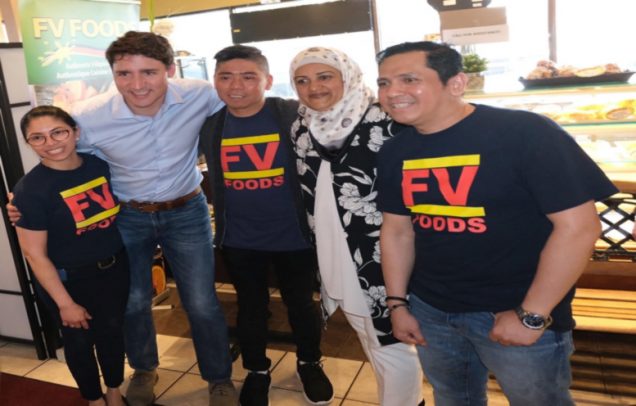
2019 Prime Minister Justin Trudeau visited FV FOODS during the first Filipino Heritage Month
9. Offer to try before they buy. Word of mouth advertising is king
Galeon introduced his products to community parties, Filipino restaurants and grocery stores by offering free samples to taste. Vendiola was a marketing wizard who took Galeon to various community events and used her car to help with deliveries while he did all the baking. Eventually, news spread about their products through word of mouth advertising.
When orders increased near Christmastime, in November – December 1999, they rented an industrial kitchen shared with another catering business before moving into their first solo 2,000 sq. ft. unit on Warden Ave. and Eglinton Ave. East in early 2000 where they expanded their product line with cakes and other pastries and hired their first employee.
In these early years, they started to thrive with the help of Vendiola’s sisters as volunteers and Mel’s family and former suppliers in the Philippines who generously sent him handwritten family recipes which were added to FV Food’s catering menu.
Now that they officially registered as a food manufacturing business for mass production, they had to print labels for their products. In gratitude for Flor Vendiola’s selfless support and faith in him, Galeon suggested that they name the business in her honor using her initials. In 2002 they had five employees and grew their team to ten before moving to the next location. As the business prospered, they moved to a larger 8,000 sq. ft. bakery/grocery store on Warden and Eglinton with 20 employees in 2006. The Mississauga store was launched in the same year followed by another branch on Bathurst St. and Wilson Ave. in 2007. In 2009, they opened a fourth store on St. Clair, followed by another on Dufferin St. and Steeles Ave. in 2011. In 2013, FV Foods launched their sixth location at Warden and Lawrence.
10. Have a Unique Selling Proposition
In 2010, the emergence of many large Chinese and other Asian supermarkets drove small Filipino stores out of business, including the ones that carried FV Foods’ baked goods. Large Asian supermarkets with their lower prices attracted bargain-hunting Filipino customers. Knowing that they were unable to compete with the competition’s size and low prices for many grocery items, Galeon knew that in order to bring people to their store, they had to offer something the competition did not have. On March 9, 2011, FV Foods offered hot Filipino takeout food which became a hit and the business eventually evolved into dine-in restaurants and party venues. Also, they ended up supplying the Asian supermarkets with their baked goods, turning their former competitors into regular big customers.
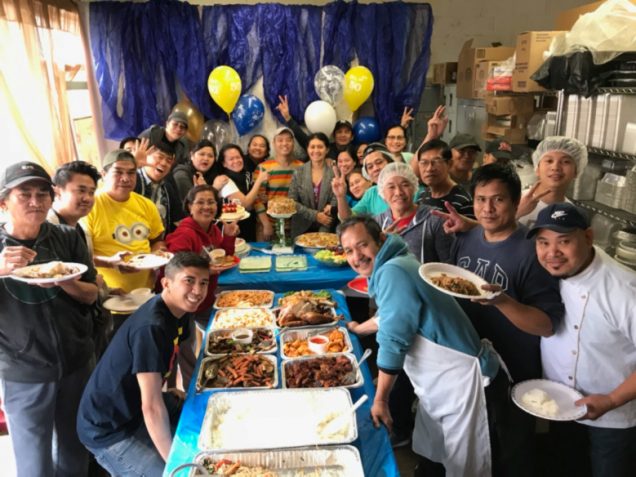
2019 FV Foods staff party
11. Be prepared for emergencies
As they were ramping up production and fulfilling orders for Christmas, their busiest time of the year, a severe ice storm wreaked havoc across Southern Ontario and parts of the U.S. on December 20, 2013 leaving many homes and businesses without electricity. The FV Foods factory and all branches had no power, no generator and could not cook or safely store their food for days so their inventory had to be discarded. This major loss from what should have been the most profitable month was devasting as they struggled to recover.
12. Know your numbers even if someone is handling your accounting
Less than a month later, on January 3, 2014, Vendiola suddenly passed away from a heart attack leaving Galeon to pick up the pieces to lead all six locations with almost a hundred employees all by himself. They always had clearly defined roles. Galeon managed the kitchens and product development while Vendiola handled the accounting, deliveries and office work. This major adjustment during an already stressful time due to the ice storm topped with his grief over Vendiola’s death aggravated the situation. Fortunately, prior to her passing, they hired an accountant who helped Galeon get up to date with their books.
13. Be kind, but assertive
Asked about what important lesson he remembers from Vendiola, Galeon said, “Learn when to say ‘yes’ and when to say ‘no’. Flor was a very generous and helpful soul, but she was also tough.” While many Filipinos might be pressured into saying “yes” and comply with things they do not want to out of “hiya” and “pakikisama” worrying about what others might think of them, Vendiola was firm. She said what she meant and stuck to her word regardless of what others thought of her and her honesty was what made her reliable.
14. Know when to ask for help and seek advice
It is good to give generously, but it is equally important to ask for help when you need it. Overwhelmed with the full weight of running all FV Foods branches on his shoulders, Galeon planned to close the St. Clair location. Fortunately, his lawyer advised him to franchise it instead allowing him to lessen his workload while earning continuous income from the locations he had already established. This initiated the restructuring of FV Foods with St. Clair franchised in 2014, followed by the Mississauga branch in 2015 and the Bathurst/Wilson branch in 2017. The Dufferin branch closed in 2015.
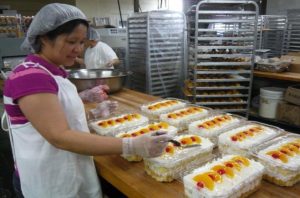
FV Foods factory
15. Conserve your time and energy by delegating
Create proper channels to free your time for the important things like product development and fine-tuning your process for growth. To prevent the stress from damaging his health, Galeon relied on his employees’ help and created clear chains of command delegating some of his previous tasks to his managers.
16. Seek God first and nurture your spiritual health
Galeon sought God daily for guidance knowing that his decisions would affect FV Food’s survival and the livelihoods of his employees. “The Lord saved me from all my problems,” said Galeon. “Even through all the struggles after Flor was gone, and after I had to franchise some of the branches because I was overworked, FV Foods is still strong. I prayed for strength, courage and energy to overcome everything and for guidance to do the right thing and choose the right people who I could trust. FV is a big company and I needed help to do things right.” His unwavering faith in the midst of adversity and his attitude of gratitude forged him into the leader his staff needed to weather the storm.
17. Treat your employees like family
Galeon now has 80 employees at two locations (excluding the franchise branches), some of whom have been with him for 17-20 years. “We treat our employees like family,” he explained. “I tell them that FV is not mine, but theirs, and they learned to care for the business and the customers as their own.” On some occasions, some new customers used to walk past Galeon as he quietly swept the floors and assumed his employees were the owners. What does he think of this? “I’m happy!” he said. “If the customers are happy with their service that they assumed they are the owners, it shows the level of care they received from my team.”
18. In nature as in business, your long-term survival hinges on your ability to adapt to change
“I told my staff we cannot stop production because we are a food business and people need us,” Galeon said. “You have to analyze a situation to think ahead and act accordingly.” In March 2020, in the early stages of quarantine when dining in restaurants was prohibited due to the COVID-19 pandemic, they were quick to adapt by offering pickups and delivery for food orders. Galeon explained the difference between their experience with SARS in 2003 and COVID-19 this year is although they have bigger operations and more to coordinate now in order to pivot to changing circumstances, it is much easier to adapt now with smart phones and social media speeding up communication and helping them stay connected with their customers on Facebook. In anticipation of potentially having less employees working per shift, Galeon purchased new machines to keep their production levels up. While some of the competing bakeries slowed down or stopped production, FV Foods continuously supplied Asian and Canadian supermarkets with fresh baked goods throughout the pandemic cementing their reliability as food suppliers in times of need.
19. Patience and perseverance are nothing without strategic planning
Many Filipino restaurants have come and gone but FV Foods is still thriving. When asked about the secret behind his staying power, Galeon shared his observations. “Most businesses are only after money hoping to get rich quick and quit at the first sign of adversity. It takes time to build your market and persevere to get a return on your investment. I don’t look for big profits right away. Business is a cycle so when you earn a little, you have to reinvest it in the business instead of letting it do nothing in the bank. Keep investing in your business to help it grow,” he advised.
20. Always aim for a higher purpose after you have surpassed your goals
Galeon’s cheerful nature makes him look younger than his age considering that he just celebrated his 50th birthday in January 2020 with a formal black-tie bash. Two months later, all social gatherings were cancelled in Toronto to slow the spread of COVID-19. Reflecting on this year, Galeon said, “Even if you have money, what are you going to do with it and fancy clothes if you can’t go to parties or stores to buy things? What is the value of money anyway? You need your family’s love and to love others and support each other. You need to take care of your health. You don’t need luxuries. Be grateful every day that you are still alive.” When asked where he finds his purpose in life now that he has achieved all the goals he set out to reach 20 years ago, Galeon replied, “In helping others and creating jobs to help people feed their families, supporting the community, helping my family back home and the church.” He credits his success to the support he received from the community. On his 50th birthday, he launched his new non-profit FV Cares in memory of Vendiola to fulfill her dream of creating a charity to benefit kababayans in need. This year, FV Cares delivered meals to frontline workers at 34 hospitals and long-term care centres – the same frontliners Galeon might have joined if he had succeeded in getting a job as a nurse had fate not pushed him in a different direction.
FV Foods’ products can now be found in Asian and Canadian supermarkets all over the GTA and other cities in Ontario, Quebec, Manitoba, Saskatchewan, Nova Scotia, New Brunswick, Prince Edward Island, and Newfoundland and Labrador. Perhaps with his natural gifts in entrepreneurship and culinary talents he was better designed to serve the world in a greater capacity than he had ever imagined. He identified his God-given gifts and shared it with the world by building a business with honesty, humility and generosity. So, what really is the secret sauce of success in life and business? I suppose like in any homemade recipe, there is a sprinkle of love. In this case, it is Galeon’s love for God, family, friends, his work and the community.
Comments (0)